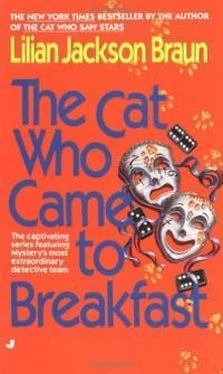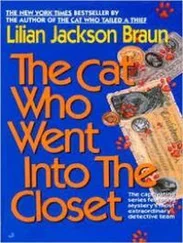"You have some interesting things here," he said, mentally comparing them with the plastic pears and bawdy bumper stickers in the shop next door.
"Ah! What is it that you collect?"
"Nothing in particular. I walked past earlier and your door was locked."
"I was taking some sustainment, I regret." She walked to a locked vitrine that had small figures behind glass. "Are you interested in pre-Columbian? I take them out of the case."
"No, thanks. Don't bother. I'm just looking." He did some more aimless wandering before saying, "Those masks in the windowwhat are they made of?"
"They are fabrications of leather, a very old Venetian" craft, requiring great precisement. I have them from the collection of a famous French film actor, but I have not the liberty to use his name, I regret."
"Hmmm," said Qwilleran without any overt enthusi-He then picked up an ordinary-looking piece of green glass. "And what is this?" "It is what one calls Depression glass." The rectangular tray of green glass was stirring vague memories. His mother used to have one on her dresser then he was young. She would say, "Jamesy, please bring my reading glasses from the pin tray on my bureau that's a good boy." He had never seen any pins on the pin tray, but he definitely remembered the pattern pressed into the glass.
"How much are you asking for this?" he asked. "Twenty-five dollars. I have a luncheon set in the same patternsixteen piecesand I make you a very good price if you take the entirement." "And how much are you asking for the masks?" "Three hundred. Are you a theater activist?" "I'm a journalist, but I have an interest in drama. I'm here to write some features about the island. How's business?"
"Many persons come in for browsement, but it is too early. The connoisseurs, they are not yet arrived."
With studied nonchalance Qwilleran suggested, "You might let me have a closer look at the masks."
She brought Comedy from the window display, and he was surprised to find it lightweight (when it looked heavy) and soft to the touch (when it looked hard). He avoided making any comment or altering his expression. "If you really like them," the dealer said, "I make you a little reducement."
"Well ... let me think about it. May I ask what brought you to the island?"
"Ah, yes. I have a shop in Florida. My customers fly north in the summer, so I fly north."
"Makes good sense," he said agreeably. After a measured moment he asked, "What is the very best you can do on the masks?"
"For you, two seventy-five, because I think you appreciate."
He hesitated. "What will you take for the piece of green glass?"
"Fifteen."
He hesitated.
Then Noisette said, "If you take the masks, I give you the piece of glass."
"That's a tempting offer," he said.
"Then in probability you will come back and take the luncheon set."
"Well ..." he said reluctantly. "Will you take a personal check?"
"With the producement of a driver's license."
"To whom do I make the check payable?"
"Antiques by Noisette."
"Are you Noisette?"
"That is my name." She wrapped the masks and the tray in tissue and put them in an elegant, glossy paper totebag.
As he was leaving, he remarked, "You and your shop would make an interesting feature for my newspaper the Moose County Something on the mainland. Might we arrange an interview?"
"Ah! I regret I do not like personal publicity. But thank you, with apologies."
"That's perfectly all right. I understand. Do you have a business card?"
"But no. I have ordered some cards, and they have not yet arrived. How to explain the delayment, I do not know."
As Qwilleran walked up West Beach Road with his totebag he frequently touched his moustache; his curiosity about Noisette was turning into suspicion. Any individual in the business world who declined free publicity in his column was suspect. Her stock was scant; customers were few, if any; she was out of place on Pear Island, where a flea market would be more appropriate; her prices seemed high, although ... what did he know about prices? He knew what he liked, that was all, and he liked those masks.
On West Beach Road the sky was gearing up for a spectacular sunset. Even the Domino Inn looked less objectionable in the rosy glow, and all the porch swings were occupied by swingers waiting fof the color show. The wooden two-seaters squeaked on their chains, musically but out of tune. As Qwilleran crossed the porch on the way to see Lori, two white-haired women smiled at him sweetly, and the Hardings waved.
"How was your dinner?" Lori asked.
"Excellent! I had shrimp gumbo, and I stopped in the antique shop and bought you a pencil tray for your deskDepression glass, circa 1930."
"Oh, thank you! My grandmother used to collect this!"
"I also bought a couple of masks I'd like to hang on my sitting room wall, if it's permissible."
"Sure," she said. "Two more holes in those old walls won't hurt. I'll give you a hammer and some nails. How do the cats like the cottage?"
"I believe they're victims of culture shock." Gallantly he refrained from mentioning the slipcovers that discomforted all three of them with their pattern if not their odor.
"Cats sense when they are surrounded by water," Lori said with assurance. "But in three days they can get used to anything."
Qwilleran said, "Koko has vandalized your wall calendar, but I'll buy you a new one and take it out of his allowance. He tore off the month of June, and now ..." He stopped abruptly as the roots of his moustache tingled. "By the way, who are my next-door neighbors on Pip Court?"
"In Three Pips we have Mr. and Mrs. Harding, a darling elderly couple. Five Pips is rented for the season to June Halliburton from the mainland. I'm sure you know her."
"I do indeed," he said crisply. "Did anyone occupy Four Pips before we arrived?"
"As a matter of fact, she used it the first two weekends but asked to move to the end of the row. She was afraid her music would disturb the Hardings. It was very thoughtful of her ... Are you going to watch the sunset from the porch, Qwill?"
"I have something to do first," he said as he hurried from the office.
CHAPTER 5
When Qwilleran returned from dinner at the hotel, the Siamese were still boycotting the slipcovers. Instead of lounging on seat cushions or bed, they crouched in awkward positions on the desk, kitchen counter, dresser, or snack table.
"Okay, you guys!" he ordered. "Clear out! We're trying an experiment." He chased them onto the porch while he stripped the premises of slipcovers, draperies, and bedcover. He also opened all the windows to dispel the haunting memory of June Halliburton, which blended her musky perfume with stale cigarette smoke. Did the Bambas know she was an inveterate smoker? Probably not. He stuffed the offending slipcovers into the bedroom closet temporarily.
What remainedwhen the roses and irises were gone was as grim as the previous decor was flashy: roller blinds on the windows, a no-color blanket on the bed, and well-worn leatherette upholstery on sofa and chairs.
Читать дальше












